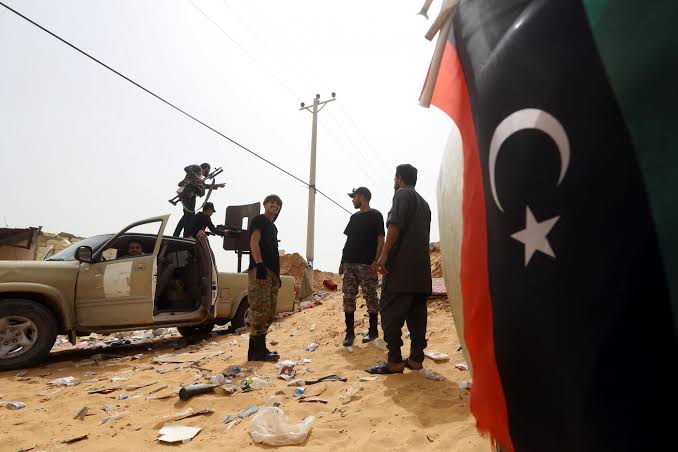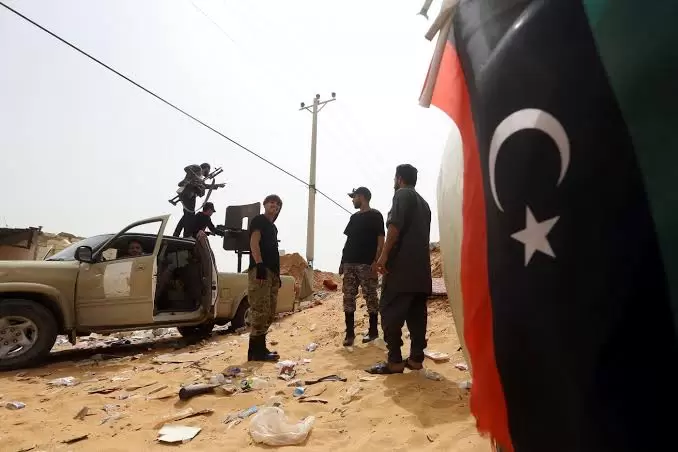

Last updated on September 11th, 2021 at 03:06 pm
At this year’s Security Conference in Munich , the European Union’s High Representative Federica Mogherini named Ukraine and Libya as her top priorities. She explained, “In Libya there is the perfect mix ready to explode and in case it explodes, it will explode just at the gates of Europe. The combination of elements present there is extremely dangerous for us and for the security of the region”.
The growing presence of international Salafi jihadists is one of the most dangerous ingredients of this Libyan mix. But what makes the country so attractive to dangerous terrorist organizations like al-Qaida, al-Qaida in the Islamic Maghreb, Ansar al-Sharia, and in particular the Islamic State (IS)?
The reasons behind this lie in Libya’s insecurity , its geostrategic important location, the plentiful hydrocarbon resources, and the situation of ISIS in the Middle East.
The current chaos in Libya provides the perfect conditions for a terrorist campaign. The absence of state structures, the availability of weapons of all kinds (from Kalashnikovs to surface-to-air missiles), uncontrolled land and sea borders, and wide ungoverned spaces in the south must be a dream for each aspiring terrorist organization.
As the Islamist parties have failed to control of the state with the help of elections several of their disappointed followers are turning evermore to violent means — and this makes them perfect recruits for Salafi jihadi groups and above all for the Islamic State. Regrettably, there are also increasing numbers of frustrated moderate Islamists turning radical. Altogether, the disillusioned Libyans are at least in part receptive to the ‘Islamic charity’ and the ‘law & order’ approach of the Salafists.
The two major sides of the civil war are fragmented and busy fighting each other. The Islamist leaning leadership in Tripoli cannot or will not challenge the Islamic extremists in its own ranks, let alone the growing IS threat. The internationally recognized government in the east relies on the polarizing military leadership of General Khalifa Haftar. His Operation Dignity forces are too weak to get the entire city of Benghazi under control, even after more than six months of fighting, and struggle to keep the Libya Dawn militias away from the oil infrastructure in the Sirte Basin. Haftar also lacks the capacity to launch a major ground offensive on the IS stronghold in Derna, a harbor city with a population of 100,000 at the edge of the Green Mountains.
Libya’s geostrategic important location provides ideal opportunities for further expansion of the Salafi jihadists’ sphere. It is simply the perfect place to destabilize the whole of North Africa and the Sahel. The next prey could be the still fragile Tunisia. The proximity to Europe and the large numbers of Libyans living already there makes Libya the best-suited staging area for terrorist attacks on the ‘Old Continent’. Given the thousands of illegal immigrants swarming from Libya to Italy, Salafi jihadists could easily infiltrate European borders. It is impossible to prevent a few terrorists hiding among thousands of immigrants from sneaking through the checks.
Libya maintains the ninth largest reserves of crude oil globally . A radical Islamist state in Libya up and running would have access to an almost inexhaustible amount of hydrocarbon resources. The income would solve all the financial requirements for terrorist attacks and a further expansion of the Salafi jihadists at ease.
In Syria and Iraq, ISIS is under heavy pressure. With mounting casualties, the terrorists increasingly find themselves forced into the defensive. This makes an ‘adventure’ in the Levant less attractive for international fighters. This could in part redirect the flow of foreign fighters toward Libya.
For all these reasons, Libya is the perfect place for IS to stage new offensives, win easy gains, and launch new expansions to other countries. They will likely absorb the other jihadi groups active in the war-torn country — or exterminate them. The group’s successes and its regular media presence have already dragged members away from other Islamist militias in Libya. If IS succeeds in Libya, the momentum could make this terrorist organization also more attractive to young Muslim extremists in other countries.
The IS rejects democracy and human rights in the western sense . As a stepping stone to its ultimate goal, the Global Caliphate, it wants to establish an Islamic fundamentalist state in Libya. The intermediate objective of IS is probably to establish firm control over at least some larger parts of the country to have a firm base for further expansion.
To this end IS will likely use a double-pronged strategy in Libya , similar to the usual Salafi jihadi pattern. On one hand, they will escalate the armed struggle in order to capture key facilities and as much territory as possible. In a first phase, they will intimidate the population in the new targeted area. Thereafter they will also assassinate former regime supporters, security forces, human rights activists, journalists, other political opponents, and Christian foreigners to prepare the ground for an open takeover of the softened target city in the third phase. The more chaos they create at the beginning, the more likely is the success of their strategy.
On the other hand, IS will fight crime and corruption with an iron fist . The organization will increase the welfare programs for the needy, in particular for the families of the ‘martyrs’, focusing on the territories it already controls. IS will demonstrate that the wellbeing of its followers is one of its major goals.
With the help of this strategy , IS intends to convince as many people as possible that its way of Islam is the ‘solution’ for all the country’s problems. It would be only necessary to follow their literal interpretation of the Quran and the Hadith (the reports of the teachings, deeds and sayings of the prophet Muhammad). The strict implementation of sharia is mandatory to end the criminal threat and to protect morality. Whoever cannot be convinced would be considered an enemy of Islam and overwhelmed by force.
IS will succeed with its strategy if international partners do not take decisive action to stabilize Libya. A weak response by the international community would allow them to expand easily further on.
The explosion of the ‘perfect mix’ in Libya will also have repercussions in neighboring countries. Unfortunately, despite several recent high-profile IS atrocities, only a few nations have recognized these terrorists as an emerging threat for the wider region.
It is certain that the chaos in Libya cannot be solved by military means alone, but any solution will have a military dimension, too. IS in Libya needs to be faced by suitable means, before it is too late. The Salafi jihadists have understood that Libya is a perfect opportunity for them – and eventually a deadly threat for Europe.
ISPI
The U.S.-based driver training company Zutobi analyzed road safety worldwide and found South Africa stays last in driving danger since…
The Basketball Africa League (BAL) returns for its 2025 season with exciting changes and developments. Since 2019 the NBA-linked basketball…
The Somali president supports their military forces to eliminate the threats from Al-Shabaab, ISIS, and Al-Qaeda. The Somali National Army…
UAE President Sheikh Mohamed bin Zayed Al Nahyan held talks with President Faustin Archange Touadéra of the Central African Republic…
African football teams struggle intensely in the World Cup Qualification rounds to earn their place on the international football stage.…
The journey toward the 2026 FIFA World Cup is rapidly intensifying for all African teams, who now hold a historical…
This website uses cookies.